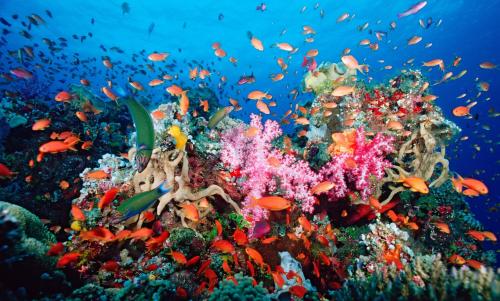Coral bleaching event going globalWe reported awhile back on the growing tragedy striking the reefs
Coral bleaching event going globalWe reported awhile back on the growing tragedy striking the reefs in the northern Pacific, and their southwards spread over the last year (see http://on.fb.me/1MJqONe). When the surface waters warm beyond a certain threshold, corals expel the symbiotic algae that provide much of their energy while using their carbonate constructions as shelter (symbiosis being defined as a mutually beneficial relationship between species). The current warming of the oceans due to climate change, and the additional burden from El Nino have both contributed to the worsening event, making it the third global bleaching (after 1998, the first in centuries or millenia, and 2010) on record. Unlike the last two, it kicked in before the El Nino event, suggesting the ocean temperatures may be reaching a tipping point for many corals as they may be warm enough to bleach corals on their own.If the warm waters persist for a long time the algae cannot rejoin the cnidarian polyps, and the reef dies, often forever. Even if they do start recovering, these events seem to be getting more frequent, and since reefs can take decades to fully recover, this rise in putting the reefs under stress when they are already under threat from several other sources ranging from ocean acidification (caused by increased CO2 in the atmosphere) to habitat destruction (see http://on.fb.me/1A9pbDk). The risk is that they will never recover if enough of these bleachings take place close enough to each other in time, something that seems increasingly likely based on the patchy record so far.The NOAA have issued a new update on the situation, to add to our last report, suggesting that some 12% of reefs worldwide have bleached in the last year, and that half of them may be permanently dead, compared to the 19% estimated for 1998. The bleaching is expected to last into next year, has spread through the Pacific and Indian Oceans, and is expected to hit the last untouched tropical ocean basin (in the Atlantic and Caribbean, already depleted by 80% over the last decades) and move back towards the northern Pacific imminently.If the relatively minor warming we have experienced so far since we started our unwitting experiments in altering atmospheric chemistry (around 0.8 degrees Celcius) is producing this big an effect on ecosystems, it suggests that those who claim that the speed with which we are warming the globe is unprecedented and gives life little chance to adapt to the altered conditions may well be right. Later in the century when we’re hitting anywhere from 2-6 degrees warmer, depending on whose figures you listen to, then the prospect of the sixth great mass extinction becomes a very realistic one. Either way, we certainly live in ‘Interesting Times’.LozImage credit: 1 Mark Conlin/Alamy2 NOAAhttp://coralreefwatch.noaa.gov/satellite/index.phphttp://bit.ly/1CoFGizhttp://bit.ly/1IRAZ1H -- source link
Tumblr Blog : the-earth-story.com
#science#coral#ocean#bleaching#coral bleaching#ecosystem#environment#climate change#global warming#chemistry

